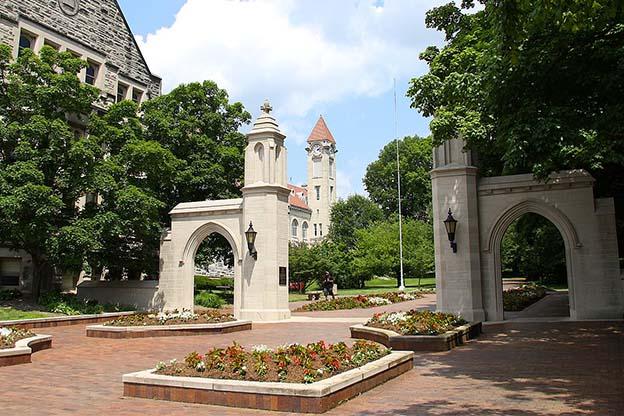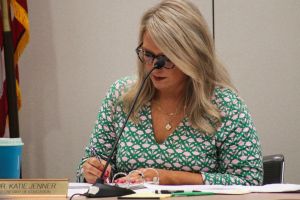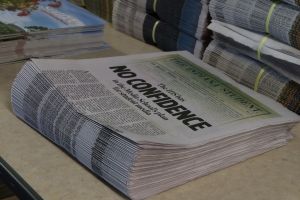
A new report released by the Foundation for Individual Rights and Expression (FIRE) ranked free speech at expression at four Indiana schools, based on survey results from students. (IT Communications Office)
How does free speech and thought at Hoosier higher education institutions compare to other schools across the country? While some fared well, Indiana University — historically rated poorly by the student body – dropped even farther in the rankings.
The results come from a new report published this month by the Foundation for Individual Rights and Expression, or FIRE, a nonprofit civil liberties organization that advocates for academic freedom and free speech.
The group annually surveys college undergraduates nationwide about perceptions of their First Amendment Rights on campuses.
Nationwide, 251 schools were ranked in the 2025 survey rankings. That included four Hoosier universities: Purdue (30th), DePauw (36th), Notre Dame (167th) and Indiana (243rd). Other Indiana schools were not ranked. Indiana University-Purdue University Indianapolis (IUPUI), which has since divided into two campuses, was ranked 54th in 2024 but was not included in the 2025 report.
Rankings improved for Notre Dame, where students described a campus community that’s equally liberal and conservative, as well as at DePauw.
Purdue, ranked the same as in 2024, had the lowest rate of students — 37% — who said they have self-censored on campus at least once or twice a month, when compared to the other Indiana schools.
Indiana University, however, dropped from its #225 position in 2024. Numerous students said in the latest survey results that the “Israeli-Palestinian” conflict, specifically, is difficult to discuss on campus — with many saying they’re afraid to speak their opinions around peers or professors.
Across the United States, Michigan Technological University received the highest ranking. Harvard University got the worst.
A press release announcing the rankings claimed the results “expose threats” to the First Amendment rights of students across the country. FIRE researchers said university responses to the Israel-Hamas conflict created situations that limited students’ rights to freedom of expression.
“Each year, the climate on college campuses grows more inhospitable to free speech,” FIRE Director of Polling and Analytics Sean Stevens said in a statement. “Some of the most prestigious universities in our country have the most repressive administrations. Students should know that a college degree at certain schools may come at the expense of their free speech rights.”
Purdue consistently ranks high
The latest survey was compiled from roughly 55,000 responses submitted by students at 254 colleges and universities. Students enrolled in four-year degrees were surveyed through the College Pulse mobile app and web portal from Jan. 13 to June 30.
After pro-Palestinian protests surged in the spring, FIRE conducted a second survey of just over 3,800 undergraduates at 30 institutions.
The results reflect a growing disconnect between how students and administrators across the country view the right to public expression. The same sentiment was expressed by students in Indiana.
Universities can have either green, yellow or red light classifications.
A “green light” rating signals that an institution maintains “no policies that seriously threaten speech,” according to FIRE, although the rating does not necessarily indicate whether a college “actively supports free expression.”
The “yellow” designation cautions that a school has at least one policy that places “a clear restriction on a more limited amount of protected expression, or one that, by virtue of vague wording, could too easily be used to restrict protected expression.”
Red schools have identified policies that FIRE determined impede the freedom of speech.
Purdue earned a green rating, based on surveys submitted by 281 students.
Of those, 63% said “shouting down a speaker to prevent them from speaking on campus” is “at least rarely acceptable,” and 25% said the same about “using violence to stop someone from speaking on campus.”
According to FIRE, for every one conservative student at the West Lafayette campus, there is roughly one liberal student. The school has placed high in FIRE’s rankings since 2021, and placed third in the nation for free speech in 2022.
At DePauw, which improved five spots from its 2024 ranking and was also rated green by FIRE for its campus speech environment, 79% of students said shouting down a speaker is, in most cases, unacceptable.
Of the 123 undergraduates at the small, private liberal arts college who submitted surveys, 45% of students said using violence to stop someone from speaking on campus is also largely unacceptable, and 62% said they had recently self-censored. The FIRE report described the campus as liberal-leaning; roughly one conservative student to every two liberal students.
Lower free speech rankings for Notre Dame, IU
And while Notre Dame improved its ranking — up from #176 last year — FIRE gave the private Catholic university a red rating.
Nearly half of the 452 Notre Dame students surveyed said they had recently self-censored on the South Bend campus, which the FIRE report indicated has about as many conservative students as it does liberal students.
Though 60% of students said it’s rarely acceptable to shout down a campus speaker, only 14% said the same about using violence to stop a person from speaking.
“I often feel that I cannot express any religious opinions on campus because it is a Catholic university and expressing something different can be scary and uncomfortable because people will change how they see you once they know you are not Catholic,” one student from Notre Dame’s 2024 graduating class said in the survey.
Other students cited hesitation when speaking about topics like sexuality, abortion, “drag queen(s)” and the Palestine-Israel conflict.
Indiana University, meanwhile, earned a yellow rating.
According to the FIRE survey, 66% of IU respondents were opposed to shouting down a campus speaker, and 32% of students said using violence to stop someone from speaking on campus is at least rarely acceptable. About half of the students reported self-censorship on the flagship campus in Bloomington, which has roughly two liberal students for every conservative student, per the FIRE report.
One student from IU’s 2026 class recalled an incident in a dining hall in which their friends “started discussing an issue which they all passionately agreed upon.”
“I held a different opinion but I was afraid they would see me differently if I shared this opinion, so I stayed quiet,” the student said in the survey.
Several students additionally critiqued professors for contributing to free speech discomfort on campus.
“Some professors make their political views and religion clear so I thought about this during one of my science classes where a religious professor made his stance clear and taught accordingly, so I knew I wouldn’t want to speak up about anything that disagreed with his perspective,” one student from the Class of 2025 said.
Another student, from the 2024 graduating cohort, said they’d had “a couple of professors be very open about their political opinion, making jokes about the opposing affiliation.”
“When someone is that open about degrading another party,” the student continued, “I wouldn’t feel comfortable saying something they don’t agree with.”
Protests over the war in Gaza broke out at numerous colleges last spring, including at IU, where students pitched tents on campus while calling for an end to violence in support for Palestinians. Ultimately, 57 people were arrested during the encampment, which ended 100 days later after a new university policy came into effect.
The new rule limits where protests can occur and prohibits any from taking place between 11 p.m. and 6 a.m. Signs and posters must be approved, and no camping is allowed. Students can be expelled if they violate the policy, and faculty could be fired.
National results from the FIRE survey shows that while protests over the Israeli-Palestinian conflict are driving campus conversations around free speech, administrators and students aren’t always on the same page about how to respond.
More than half of college students, roughly 55%, said they find it difficult to discuss the conflict on campus — a sharp increase from 26% who said as much last year.
Additionally, 24% of respondents said it was “not very” or “not at all” clear that their administration protects free speech on campus — down from 36% in last year’s survey.
In a separate line of survey questions, about 59% of students said occupying a campus building was at least “rarely” acceptable, and 35% said the same about defacing campus property.
Indiana Capital Chronicle is part of States Newsroom, a nonprofit news network supported by grants and a coalition of donors as a 501c(3) public charity. Indiana Capital Chronicle maintains editorial independence. Contact Editor Niki Kelly for questions: info@indianacapitalchronicle.com. Follow Indiana Capital Chronicle on Facebook and X.











